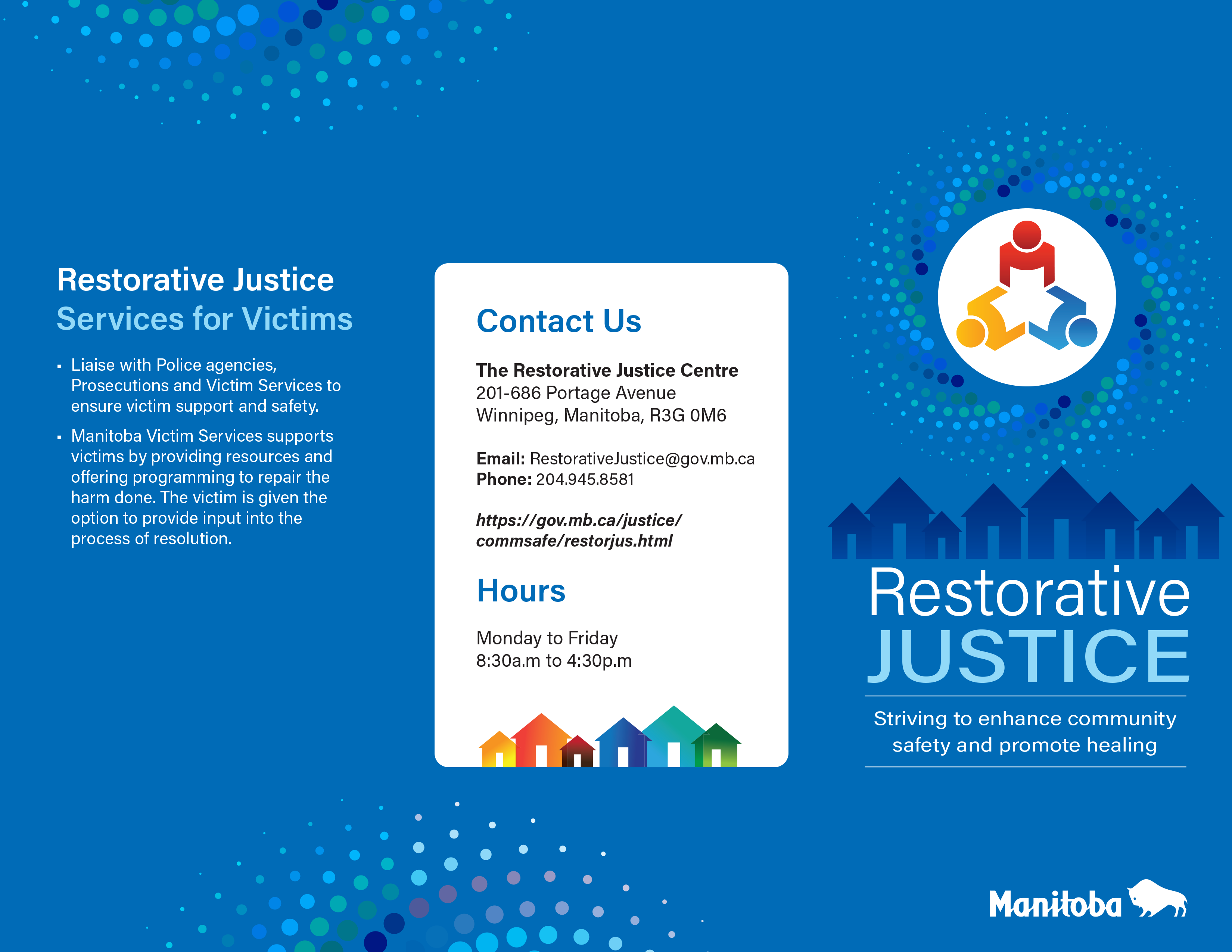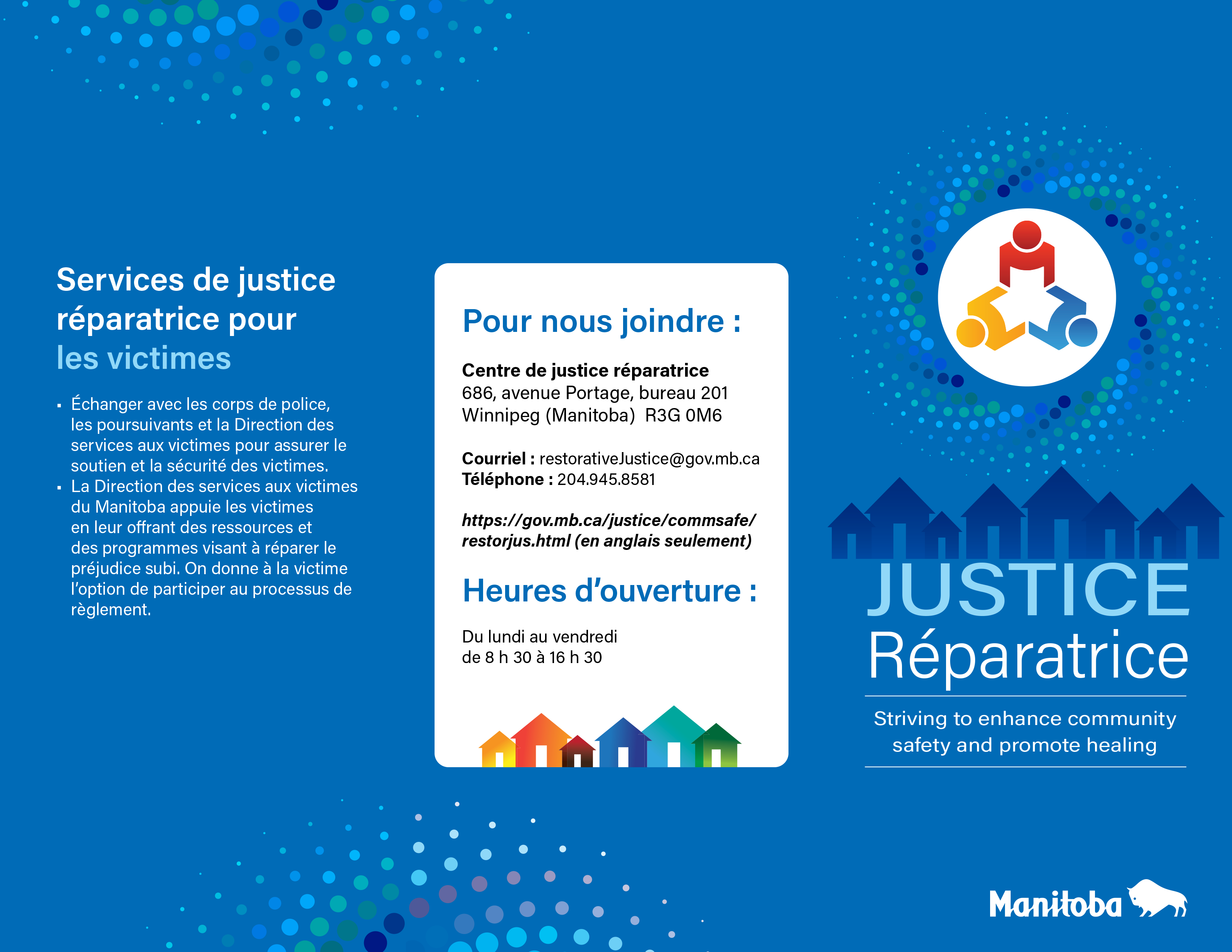RESTORATIVE JUSTICE
One of the primary goals of Manitoba’s Criminal Justice System Modernization Strategy is to use restorative justice options more effectively to improve public safety, reduce delays in the court system and ultimately reduce reliance on incarceration.
Restorative justice is an approach to crime that puts the emphasis on the wrong done to individuals and communities, and focusses on "restoring" relationships, fixing the damage that has been done and preventing more crimes from occurring.
When appropriate, victims, offenders and community members may be involved in processes to:
- hold offenders accountable;
- support victims in their healing;
- provide an opportunity for participants to express their needs;
- reduce re-offending; and
- support the safe reintegration of offenders into the community.
In Manitoba, a restorative justice approach may be used at any stage of a case by police or prosecutions, and is frequently used to address offending behaviour of individuals outside of the formal criminal justice system. Manitoba’s Restorative Justice Act, a Canadian first, came into effect November 18, 2015.
Restorative Justice Branch
Manitoba Justice’s Restorative Justice Branch works collaboratively with Victim Services to deliver diversion programming across the province, and oversees over 100 options for diversion throughout Manitoba. Manitoba Restorative Justice Program Map by Region
Restorative Justice Partners are funded programs which include Indigenous Justice Programs, Manitoba Restorative Justice Programs, and Community Justice Committees.
Indigenous Justice Programs
Canada and Manitoba support the following communities and organizations to provide Indigenous justice programs that support community driven prevention, diversion and reintegration services:
- Cross Lake
- Fisher River Cree Nation
- Hollow Water
- Manitoba Keewatinkowi Okimakanak Northern First Nations (MKO)
- Manitoba Metis Federation Community Justice Program
- Manitoba Metis Federation (MMF) Thompson Community Justice Program
- Norway House Cree Nation
- Onashowewin (Winnipeg)
- St Theresa Point First Nation Tribal Court
- Southern Chiefs Organization (SCO)
Manitoba Funded Restorative Justice Programs
- The Salvation Army (Winnipeg)
- Mediation Services (Winnipeg)
- Westman Mediation Services and the Parkland Mediation Services (The John Howard Society of Brandon, Inc.).
Community Justice Committees
Community justice committees are voluntary and involve community members providing responsive consequences to meet the needs of victims, offenders and communities. There are currently 55 committees across the province.
Restorative Justice Centre Hubs
The establishment of restorative justice centre hubs support the delivery of programming throughout the province and allow for a regional focus that streamlines the restorative justice process for RCMP, provincial and federal prosecutions and clients.
There are hubs in Winnipeg and Thompson, and virtual hubs supporting the Interlake-Eastman, South-Central and Westman-Parkland regions.
Restorative Justice Week
Restorative Justice Week began in 1996 and is observed nationally, usually during the third week of November. Restorative Justice Week highlights the accomplishments of restorative justice practices with events such as film festivals, discussion panels, meetings and presentations.
Links
- Principles and Guidelines for Restorative Justice Practice in Criminal Matters
- Restorative Justice – Key Elements of Success
Contact
Restorativejustice@gov.mb.ca.
The Restorative Justice Centre
201-686 Portage Ave., Winnipeg, MB
204-945-8581




